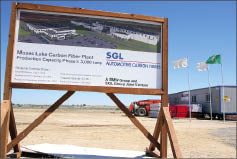
Home » Lydig nabs big Moses Lake job
Lydig nabs big Moses Lake job
Contractor to erect first phase of carbon fiber plant

July 29, 2010
Lydig Construction Inc., of Spokane, has won the contract to build the first phase a plant at Moses Lake, Wash., that will produce carbon fiber for use in making materials for components of a BMW car, called the Megacity Vehicle, that's to be released in 2013. The joint venture that plans to develop the plant says it expects its total investment in that initial phase will be about $100 million.
BMW claims the "revolutionary" electric car that will utilize fiber made at the plant will be the world's first volume-produced vehicle with a passenger cell, or compartment, made from carbon.
SGL Automotive Carbon Fibers LLC, a U.S.-based joint venture of two German companies, BMW Group and SGL Group, broke ground on the Moses Lake project July 7, and Lydig already has begun moving dirt, says SGL Automotive's Steve Swanson, who is overseeing the project and will manage the plant.
SGL Automotive is developing the plant on 60 acres of land it has bought just east of Grant County International Airport, north of Moses Lake, and the company says it has an option to buy another 60 acres for future expansion of its operations there.
The joint venture announced plans for the project in October, but awarded the construction contract just a couple of weeks ago.
Lydig referred questions about the project to Swanson, who says the Spokane company was chosen through a competitive bid process. He declines to disclose the dollar value of the contract, but says it's large enough that as many as 200 construction workers are expected to be working on the project at peak periods. He says Lydig has indicated it will be using a number of Spokane-area subcontractors on the job.
The initial phase of the project, on which the $100 million cost estimate is based, will include construction of an administration and warehouse complex and a large production building that will include two production lines and will provide 80 jobs, Swanson says. Long term, SGL Automotive anticipates developing facilities there for as many as 10 production lines, depending on demand, he says.
The first production line is expected to begin operating about a year from now, accounting for about 40 of the 80 jobs, with the second line anticipated to begin operating by the end of 2012, he says.
Lydig, a 54-year-old company that also has a Bellevue, Wash., office, perennially has been one of Spokane's largest general contractors, also offering design-build and construction-management services. For a Journal of Business list of leading contractors published earlier this year, it reported 2009 contract revenues of $319.7 million, which—though down from $334.9 million in 2008—still put it easily at the top of all construction companies here that provided data for the list.
Lydig has continued to land sizable projects despite the continuing weak economy.
It began work earlier this year on a $56 million jail project in Des Moines, Wash., roughly midway between Seattle and Tacoma, and is a partner with Seattle-based McKinstry Co., which has an office here, on a $33 million systems upgrade project in the Thomas S. Foley U.S. Courthouse downtown.
Last fall, it won a contract to build a $96 million Veterinary Medical Research Building on Washington State University's campus in Pullman.
SGL Automotive says the Moses Lake plant that Lydig has begun constructing for it will be "a fundamental component of the joint venture's strategy to commercialize manufacturing of lightweight carbon fiber reinforced plastics for use in BMW Group's future Megacity Vehicle," which will be designed for urban use.
It says, "Carbon fiber technology is becoming increasingly important in the materials substitution process to lighter materials, which helps to improve fuel consumption and lower CO2 emissions." In this case, the company says, it will use the material specifically to offset the additional weight of an electric vehicle—typically 250 to 350 kilograms, or upwards of 550 pounds.
SGL Automotive says its decision to build the plant in Moses Lake was based mostly on competitive energy costs, favorable infrastructure conditions, existing utilities, a skilled labor force, and fast permitting processes. Once operating, the initial phase of the plant is expected to produce about 1,500 metric tons of carbon fiber annually.
The plant will use a raw "precursor" material shipped there from Japan to produce the carbon fiber, which then will be incorporated into carbon fiber fabric at another new plant, in Wackersdorf, Germany. BMW says it then will use that fabric to make components for the car at a plant in Landshut, Germany, and will assemble the car at a plant in Leipzig, Germany.
Latest News
Related Articles



